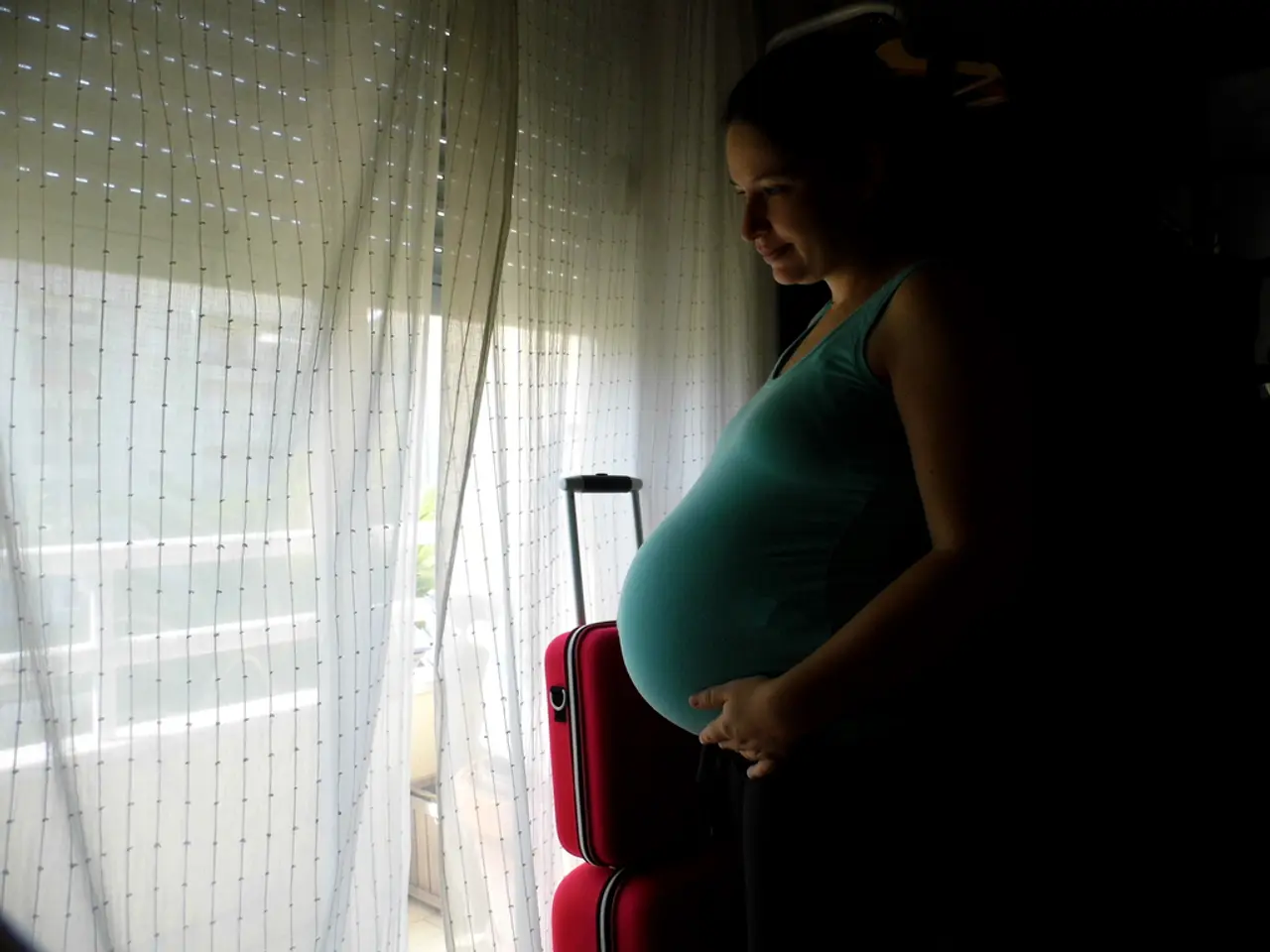Unusual heavy menstrual flow: Is it expected?
Heavy vaginal bleeding during the first trimester of pregnancy can be a cause for concern. Here are some common causes and their symptoms:
Ectopic Pregnancy
An ectopic pregnancy occurs when the fertilized egg implants outside the uterus, usually in the Fallopian tube. Symptoms may include pain (often severe and localized), heavy vaginal bleeding, weakness, fainting, shock, and may lead to rupture causing life-threatening internal bleeding. This is a medical emergency requiring immediate treatment.
Miscarriage (Early Pregnancy Loss)
Heavy bleeding can be a sign of miscarriage, often accompanied by cramping or abdominal pain. Other symptoms include heavy vaginal bleeding, tissue passage, pelvic pain or cramping, sometimes accompanied by dizziness.
Implantation Bleeding
Implantation bleeding occurs when the fertilized egg attaches to the uterine lining, typically causing light spotting rather than heavy bleeding. Usually, this is painless and mild spotting, not heavy bleeding.
Molar Pregnancy (Gestational Trophoblastic Disease)
Molar pregnancy is an abnormal fertilization causing abnormal tissue growth in the uterus. This may cause heavy bleeding, accompanied by rapid uterine growth disproportionate to gestational age, nausea, and unusually high levels of pregnancy hormone (hCG).
Other Less Common Causes
Other less common causes in the first trimester include cervical causes such as infection or cervical polyps, and subchorionic hemorrhage, bleeding between the uterine wall and the gestational sac, which can cause bleeding with or without pain.
Key Symptoms to Watch For
Alongside heavy bleeding, key symptoms to watch for include pain or cramping in the abdomen or pelvis, dizziness or fainting (signs of significant blood loss), passage of tissue, and any signs of shock (weakness, rapid heartbeat).
Important Note
Heavy bleeding in the first trimester should prompt immediate medical evaluation to determine the cause and prevent complications, especially since conditions like ectopic pregnancy can be life-threatening.
If you are experiencing heavy vaginal bleeding during pregnancy, it is crucial to consult a healthcare provider immediately. Pregnancy loss occurs in around 10% of known pregnancies, and it can be physically and emotionally challenging. Speaking with a counselor, a mental health professional, or members of a support group can provide comfort and assistance during this difficult time.
If heavy bleeding accompanies severe or other concerning symptoms, urgent medical care is necessary. Heavy implantation bleeding may indicate a problem and should be discussed with a healthcare provider. About 15-25% of people experience some bleeding in the first trimester of pregnancy.
Anyone experiencing heavy bleeding in the first 12 weeks of pregnancy or any symptoms of an ectopic pregnancy should speak with their midwife, a doctor, or another healthcare provider as soon as possible. Implantation bleeding is typically light and lasts a day or so, with blood often pinkish or brown.
In the case of a molar pregnancy, if you experience any of the symptoms, contact your doctor immediately. If experiencing any symptoms of pregnancy loss, contact your midwife or doctor immediately.
An ectopic pregnancy occurs when a fertilized egg implants outside of the uterus, usually in a fallopian tube. Subchorionic hematomas involve the placenta separating from part of the uterus wall, allowing blood to pool in the space between.
Symptoms of a molar pregnancy include vaginal bleeding, grape-like cysts from the vagina, intense nausea, vomiting, pelvic pain or pressure, anemia, ovarian cysts, high blood pressure, an overactive thyroid, and a uterus that is an unusual size.
Ectopic pregnancies are not common, representing only a small percentage of all pregnancies. Molar pregnancies are rare, representing fewer than 1% of pregnancies in the United States.
Symptoms of pregnancy loss include vaginal bleeding that may be light or heavy, passing blood clots, cramping, stomach pain, lower back pressure or pain, a change in vaginal discharge. A molar pregnancy can cause a rare form of cancer called choriocarcinoma if a person does not receive medical attention.
Subchorionic hematomas are the most common cause of vaginal bleeding in pregnancy. Implantation bleeding usually occurs within the first 1-2 weeks after conception.
- In the case of a suspected ectopic pregnancy, immediate medical attention is essential due to the life-threatening nature of this condition.
- The symptoms of a molar pregnancy include heavy vaginal bleeding, grape-like cysts from the vagina, intense nausea, and an unusual size of the uterus.
- It's crucial for expecting parents to be aware of their health-and-wellness, especially during the first trimester, as heavy vaginal bleeding can signify various medical-conditions such as ectopic pregnancy, molar pregnancy, or miscarriage.
- A key symptom to watch for in cases of heavy vaginal bleeding, aside from pain or cramping, is the passage of tissue or signs of shock.
- If left untreated, a molar pregnancy can lead to a rare form of cancer called choriocarcinoma.
- Pregnancy loss occurs in around 10% of known pregnancies and can be emotionally challenging. Seeking help from a counselor, mental health professional, or support group can provide comfort during this difficult time.
- Subchorionic hematomas, a common cause of vaginal bleeding in pregnancy, involve the placenta separating from part of the uterus wall, allowing blood to pool in the space between.
- Implantation bleeding typically occurs within the first 1-2 weeks after conception and is usually light, with blood often pinkish or brown. However, heavy implantation bleeding may indicate a potential issue, and discussing it with a healthcare provider is advisable.




